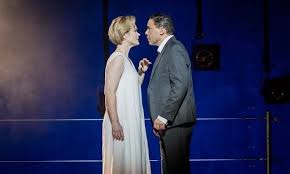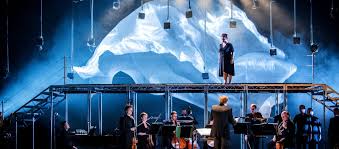Milton Keynes Theatre, 21-22 March 2017
Frank Martin’s Le Vin Herbe is hardly a regular part of any company’s repertoire so it was all the more exciting to see it for the first time in a magnificent presentation from WNO. The composer did not really intend it to be staged and it is closer to Stravinsky’s Oedipus Rex or possibly Britten’s Rape of Lucretia in its use of narrators and chorus to move the narrative forward, acting as both a framing and distancing device. Moreover, Polly Graham’s visually stunning production uses the chorus as the setting, their fluid movement shaping the spaces in which the drama unfolds. Added to this some of the most effective lighting, by Tim Mitchell, that we have seen in a very long time and the whole was frequently mesmerising in its impact.
The story of Tristan and Iseult is familiar to most of us from Wagner, but Martin takes a different approach, one that uses different elements of the myth and brings a much strong ethical tone to the outcome. Mark could have killed them but chooses not to do so; the lovers never actually consummate their desire, dying as chaste as they lived, though overcome by passion to the point of madness.
All of this in couched in the most refined of musical scores, using a small string ensemble placed in the centre of the stage under the deft control of James Southall.
The cast had a number of very familiar voices. Tom Randle was a fine if angst ridden Tristan, the sensitivity of his acting matching that of his voice. Caitlin Hulcup was a statuesque Iseult, able to hold a pose in telling but naturalistic fashion, and a beautiful voice to match her presence.
It was good to see and hear Catherine Wyn-Rogers in the small part of Iseult’s Mother, the warmth of her tone shining through as ever. Martin writes for a myriad of small parts, some of whom emerge briefly from the chorus, others being named individuals who disappear as quickly as they came. Needless to say with the quality of the WNO chorus there was not a weak link here and Gareth Dafydd Morris made a very strong impact with the beauty of line he produced as Kaherdin and I am sure, as a recent member of WNO, we shall see much more of him.
I am not sure if the work was being recorded. It certainly deserves to be far better known than it is at present.
The following night’s revival of La Boheme may not have come up to the heights of Martin, but it was well sung throughout with Matteo Lippi and Jessica Muirhead, as Rudolfo and Mimi, in well matched romantic voices which filled the theatre with ease and beauty of line. Lauren Fagan is a brash Musetta, with Gary Griffiths a highly convincing Marcello.
While the production has some telling moments – Rudolfo return’s Mimi’s key to encourage her to tell her story – it too often moves away from its initial naturalism. Characters in what is supposed to be a bitterly cold winter, frequently take their coats off, and there is little difference between inner and outer scenes.
Manlio Benzi in the pit had a sharp sense of Puccini’s line and tempi were always convincing. A most pleasant evening on the ear if not always on the eye.


